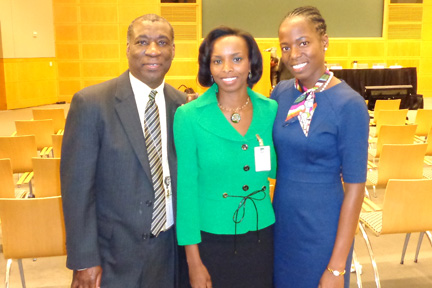Two Vincentian economists are among the contributors to a new book — The Eastern Caribbean Economic and Currency Union: Macroeconomics and Financial Systems — published by the International Monetary Fund (IMF).
They are Wendell Samuel, deputy division chief of the Caribbean II Division (former Regional Resident Representative for the Eastern Caribbean Currency Union –ECCU) and Jehann Jack, economist in the ECCU Regional Resident Representative Office.

The book, launched Thursday at the IMF headquarters in Washington, DC on Thursday was edited by Alfred Schipke, division chief in the Asia Pacific Department, Aliona Cebotari, and Nita Thacker, both deputy division chiefs of the Caribbean I (ECCU) Division.
The book takes a comprehensive look at the Eastern Caribbean Economic and Currency Union (OECS/ECCU) — one of four currency unions in the world — including its organization, economic and financial sector linkages; and proffers policy recommendations to foster economic growth. Other chapters focus on offshore financial centers, experiences with debt restructuring, and the regional capital market.
As in other parts of the world in the aftermath of the global economic and financial crisis, the region is at a crossroads, facing the major challenges of creating jobs, making growth more inclusive, reforming the banking system, and managing volatility, while grappling with high public debt and persistent low economic growth, a release about the publication says.
And, Sir K. Dwight Venner, governor of the Eastern Caribbean Central Bank, in an advance review, said the handbook on the ECC) “covers, at the institutional and policy levels, the critical issues that have impacted the stability and growth of the member countries of the ECCU, and which are informing the debates on the future of these countries.
“The handbook provides a compelling narrative on the functioning of the ECCU and is supported by a wealth of empirical data that will be extremely useful to public sector policymakers, the private sector, and the general public in the ECCU, as well as the international community,” Sir Dwight further said.
The publication also features reviews from St. Kitts and Nevis’s Prime Minister and Minister of Finance, Dr. Denzil L. Douglas, Professor Jeffrey A. Frankel of Harvard University, John F. Kennedy School of Government; and Dr. Lester Henry, lecturer in economics at University of the West Indies.
IMF’s Managing Director, Christine Lagarde penned the foreword.
Min Zhu, deputy managing director of the IMF, delivered opening remarks for the event, which included a panel discussion moderated by Adrienne Cheasty, deputy director of the Western Hemisphere Department.
Co-editors Alfred Schipke and Aliona Cebotari provided an overview of the book. The panel also comprised Françoise Clottes, country director for the Caribbean at The World Bank, and Janet Harris, The World Bank’s Alternate Executive Director for Canada, Ireland, and the Caribbean.
Among the attendees at the book launch and seminar were international diplomats, including La Celia A. Prince, Kingstown’s ambassador to the United States.






Fantastic! I hope a copy will be in every library and secondary school in SVG. I am no fan of IMF but I will like to get a copy of this new book.
I would like to write the forward to the book and perhaps weave a few other titbits into it.
I would of liked to add a piece about how under the instructions of the Cubans, Maurice Bishop told his central committee to keep two sets of books at the treasury to commit fraud against the IMF.
How Ralph Gonsalves told us he is here to finish the work of Maurice Bishop, time and time again I have asked what part of Bishops work is he referring to, we are left to decide for ourselves. Then when someone writes or says something he doesn’t like he will want to sue them.
GONSALVES WHAT PART OF BISHOPS WORK ARE YOU REFERRING TO, SOME OF IT, ALL OF IT, TELL US TO SAVE US THINKING THE WORST.